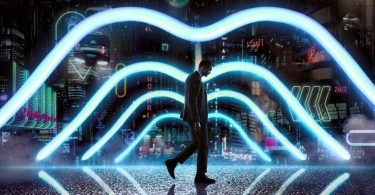Firstly, I have to admit that I ended up going to see Lucy completely by accident. An open air film screening in Paris was cancelled, so a friend and I ended up tucked into a tiny cinema near our hotel, watching a) the only thing showing at that time of night and b) in English.
I’d mistakenly told my companion that this was a film about a guy who falls in love with the voice of his virtual planning system (actually Her, circa 2013) so imagine our surprise when someone was shot within the first five minutes.
Different from the start
Lucy is a film that lets you know how different it is right from the start. The opening montage about the evolution of our planet and species, coupled with an intense voice over from Johansson – famous for her deep, sultry tones – seems to tell you from the start that this is a film about something worth listening to, even if you don’t fully understand what it is.
Johansson plays an American woman studying in Taiwan, who’s tricked into becoming a drug mule by her boyfriend (he who loses his life straight away). A Korean drug lord sews a bag of CPH4 into her abdomen, along with several other unwitting travellers, and all are given passports to return home where the drugs will be removed and sold.
While in captivity, Lucy is beaten and the bag inside her tears, releasing a large quantity of the drug into her system. Cue lots of spasms and glowing blue eyes and Morgan Freeman to explain what the heck is going on.
An interesting concept
Freeman plays Professor Samuel Norman, a renowned scientist and doctor who has devoted his life to researching the capacities of the brain. Interspersed with Lucy’s adventure story are clips of Professor Norman lecturing in Paris. He explains to his academic crowd (and us goggle-eyed peasants in the cinemas) that humans only use 10 per cent of their brain’s cerebral capacity, basically meaning that we don’t do very much at all.
Dolphins use 20 per cent and have developed their own internal sonar systems, an indication of how far we could come if we learn to access more of our cerebral capacity. It’s not necessarily scientific fact, but an interesting concept, and certainly makes the film much more than basic science fiction.
Reaching full capacity
Lucy, who by now has realised what the CPH4 drug is doing to her, has made contact with Professor Norman. After proving to him that she is slowly accessing 100 per cent of her cerebral capacity by controlling all the electronics in his hotel room, she makes her way to Paris to find him.
Helped along the way by dashing police captain Pierre Del Rio (Amr Waked) Lucy finds Norman, and starts to impart her vast knowledge onto a computer system to be stored forever.
It’s a movie full of information that somehow seeps under your skin while you watch – during the screening time you’re mostly focused on Johansson’s killer moves, the classic fight scenes between the French police and the Korean drug gang, and the dark comedy as Johansson calmly addresses the staggering effects the drug have on her body.
But beneath all that there are many unnerving messages in the film – firstly, that drug trafficking does occur like this, and innocent people are having their stomachs sewn open for the sake of cocaine and other such hard drugs.
Secondly, Johansson’s abilities as her cerebral capacity expands are astounding, but also possible, as everything is explained in relation to nerves and neurones. The destabilizing of her cells and her complete loss of emotion are unsettling, and showcase the effect of powerful drugs, as well as the lengths human kind could go to in order to access knowledge and power such as Lucy possesses.
Too short
The only drawback to the film is that it’s short, and too short to answer all the questions that you’ll leave the cinema with. Lucy’s disappearance at the end is unsatisfying, particularly as lost and heart-broken Captain Del Rio looks on, and Professor Norman fails to explain how he will carry on Lucy’s incredible legacy.
There could easily have been another hour to the film, enhancing on the science behind it, showcasing more of Lucy’s abilities and how she battles with her old human side, as well as more of the amusing Mr. Jang and his hapless bunch of Korean homies.
You might not understand what you’re watching while you’re watching, but Lucy will certainly leave you talking for several days after. The combination of supposed scientific explanation and a voice of reason in Freeman, coupled with action and a little romance, makes the film more than just science fiction. It’s not reality, but it’s creating a possibility, and that will always draw people in to any story.
Kettle Rating: 4/5
What do you think? Have your say in the comments section below.








